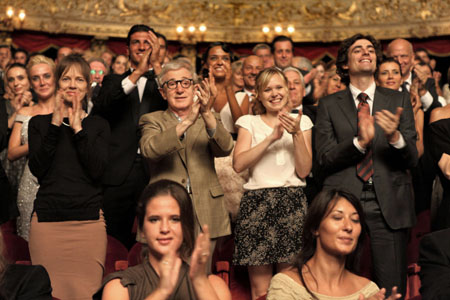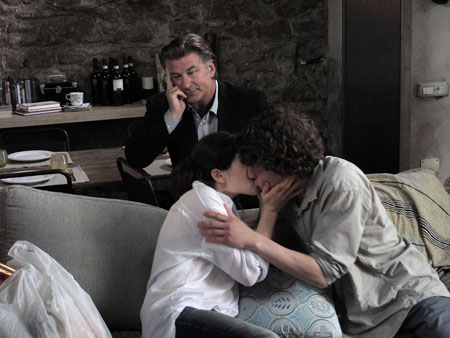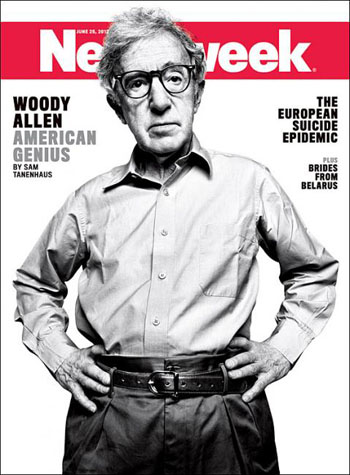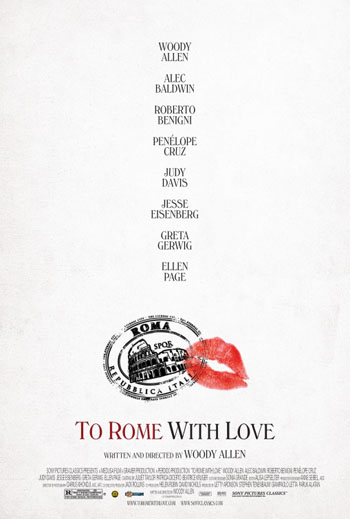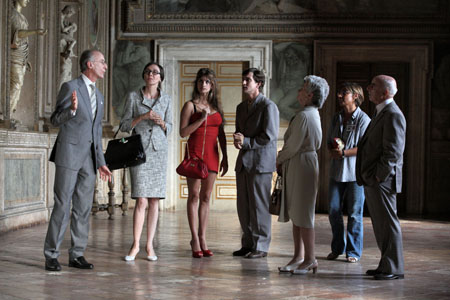Woody Allen’s To Rome with Love, starring himself, Alec Baldwin, Roberto Benigni, Penelope Cruz, Judy Davis, Jesse Eisenberg, Greta Gerwig, Ellen Page, Antonio Albanese, Fabio Armiliato, Alessandra Mastronardi, Ornella Muti, Flavio Parenti, Alison Pill, Riccardo Scamarcio, and Alessandro Tiberi, opened in Italy back in April—so naturally the reviews in that first round are all in Italian. Now that the Los Angeles Film Festival has opened with the North American premiere, the first reviews in English are coming in, and we’ll begin with Emma Bernstein, writing for the Playlist: “In the recent PBS American Masters portrait of Woody Allen by director Robert Weide, Allen describes how he has a file folder filled with hundreds of loglines for movies he has come up with over the years; after completing each film, he sorts through them, finds one that speaks to him at the time and writes it up. To that end, To Rome With Love feels like four minor stories that Allen found in a pile and loosely stitched together in a narrative tied to Rome. That said, Rome is beautiful, and a mouthwatering set for any director. Unfortunately, you can’t build a movie on a set alone.”
“Allen inadvertently opens To Rome With Love by establishing a metaphor for its flaws,” notes indieWIRE‘s Eric Kohn. “A loopy traffic cop, initially the movie’s narrator, inadvertently causes an accident and then addresses the audience about the swirling mini-narratives about the unfold. Like the cars, the ensuing plot veers wildly from one place to the next, slamming a series of events together without even attempting to make them flow. This might not matter much if individual scenes carried enough of Allen’s wit to render the lack of fluidity irrelevant, but the material carries the treacly, half-baked feeling of Allen on autopilot.”
“All things considered,” writes Todd McCarthy in the Hollywood Reporter, “it’s a relief to learn that Allen’s next production will be set in New York and San Francisco, as he would seem to have played out his string in Europe for the moment. Although the character he portrays here is a reluctantly retired opera director who discovers a brilliant tenor, Allen the writer-director has gone tone-deaf this time around, somehow not realizing that the nonstop prattling of the less than scintillating characters almost never rings true.”
But Variety‘s Peter Debruge argues that “the consistently prolific septuagenarian has been delighting a wider audience than ever with his recent visits to London (Match Point), Barcelona (Vicky Cristina Barcelona) and Paris (Midnight in Paris, Allen’s top-grossing pic). The standard complaint goes that Allen is now making movies for the very pseudo-intellectuals his characters have long derided, as if the multihyphenate’s lifelong preoccupation with death must necessarily become more profound the nearer he gets to the end. Instead, Allen seems increasingly relaxed, as if determined to meet that tall dark stranger with a chuckle, an attitude born out by this relatively casual Roman holiday.”
Steven Zeitchik in the Los Angeles Times: “At several points in the new film, Davis’s Phyllis tells Allen’s Jerry that he ‘equate[s] retirement with death.’ As Allen prepares to shoot his eighth movie since turning 70, one gets the sense those words are close to the filmmaker’s heart.”
For the New York Times, Dave Itzkoff talks with Allen “about four movies by Italian filmmakers that influenced him most profoundly. ‘They invented a method of telling a story and suddenly for us lesser mortals it becomes all right to tell a story that way,’ Mr. Allen said. ‘We do our versions of them, never as shockingly innovative or brilliant as when the masters did them.'” The films: Vittorio De Sica‘s The Bicycle Thief (1948) and Shoeshine (1946), Michelangelo Antonioni‘s Blow-Up (1966), and Federico Fellini‘s Amarcord (1973).
As it happens, a two-hour cut of Robert Weide’s Woody Allen: A Documentary (the original ran over three hours) opened in a few theaters in the UK last week. The Observer‘s Philip French finds Woody “in fine, funny, frank, self-disparaging form, there are fascinating revelations on every aspect of his life, well-chosen extracts from his films and TV interviews, and a glimpse of that Olympia typewriter, a German model, on which he has tapped out every word he’s written since he bought it as a teenager some 60 years ago. Has any instrument since Shakespeare’s quill been the conduit of more pleasure to mankind?” More from Peter Bradshaw (Guardian, 3/5), Dave Calhoun (Time Out London, 4/5), and Robbie Collin (Telegraph, 3/5).
Updates: Writing for Vanity Fair, Bruce Handy notes that the cast “pulls a lot of freight, as does Rome itself—this is the literally sunniest movie Allen has ever made. But like a number of the director’s recent movies, this one often feels like a second- or third-generation Xerox of earlier, better films. Still, it made me happy just to spend 90 minutes in Woody World, that Neverland rooted in mid-century aspiration where people still quote Freud and argue about abstract art and take long, Jamesian trips abroad with seemingly no means of support. When it comes to Allen, I’m all in; I’m a lifer.”
At Movieline, Jen Yamato notes “how baldly [Allen] confronts the funny business of art and celebrity in the film, from all sides—the fleeting pointlessness (and compulsive appeal) of being famous for famous’ sake in today’s reality TV culture, the eternal struggle to balance art and commerce, even the oiliness and pretension pervasive to Hollywood types alike, personified by Italian actor Antonio Albanese and with particular deftness by Ellen Page.”
Updates, 6/19: “Allen in person is nothing like the nebbishy mess of phobias and insecurities he has been impersonating, on stage and screen, for half a century, dating back to his days doing stand-up in Greenwich Village clubs like The Bitter End.” Sam Tanenhaus in the cover story for this week’s international edition of Newsweek: “He has the reputation, in fact, for almost terrifying self-assurance and will brusquely dismiss established stars (casualties include Michael Keaton, Sam Shepard, and Christopher Walken) if they fail to meet his exacting standards on the set. But monomania has made him his era’s greatest comic presence, the one true heir of Charlie Chaplin and Buster Keaton. Allen, however, measures himself against stiffer competition. ‘I think I’ve now made almost 45 films,’ he says. ‘Some nice ones. No masterpieces. I don’t kid myself. It’s not false modesty. If you look at Rashomon, The Bicycle Thief, The Grand Illusion, as masterpieces, [then] no: I don’t have a film I could show in a festival with those films.'”
“Allen’s transformation from the most successful ‘intellectual’ comedian of his time to a respected film artist occurred during my adolescence,” writes Bill Weber in Slant, “and he’s yet to extinguish my affection for the period when the limited opening of each of his movies was a New York event. But his reputation as someone who created lively comedic and dramatic characters for [Diane] Keaton, Mia Farrow, and even Gena Rowlands is hard to square with the flagging auteur who extravagantly wastes the talents of Cruz, Alison Pill, and Greta Gerwig (in the utterly perfunctory role of Eisenberg’s girlfriend) in To Rome with Love…. Not only does the late-career renaissance of a Huston or Buñuel seem beyond him, but movies like this one put him in danger of comparisons with Chaplin‘s final, disastrous film, A Countess from Hong Kong, or Bob Hope robotically reading jokes for decades of his dotage. Basta, Woody, basta.”
To Mark Olsen, writing for Box Office, “To Rome With Love feels unfinished—a problem it partly addresses but can’t recover from.” For Michael Nordine, writing for Filmmaker, it’s “actually quite an oddity—one whose worthwhile elements never quite congeal, perhaps, but also a pleasant enough jaunt through the Eternal City.” 2.5 out of 5 stars from Nicholas Bell at Ioncinema.
“It’s almost cruel to criticize something so essentially lighthearted and disposable, but it must be said that a lot of these jokes feel distinctly recycled, mainly from Broadway Danny Rose,” writes Joshua Rothkopf in Time Out New York. Also, Rothkopf, David Fear, and Keith Uhlich note that on the same day that To Rome with Love opens in NYC, i.e., Friday, “Film Forum kicks off a weeklong revival of his 1977 classic Annie Hall; and comedian Janeane Garofalo will present a special screening of 1989’s Crimes and Misdemeanors at Cinema Village on Tuesday 26. In honor of this Woodcentric week, we review three distinct phases of the writer-director-star’s career.” But wait, there’s more. Uhlich on Annie Hall: “As the story toggles between punch lines involving Marshall McLuhan and The Sorrow and the Pity and gut punches like Annie’s heartrending rendition of ‘Seems Like Old Times’ or some half-recalled joke about eggs, you delight in the seeming effortlessness of a movie born out of turmoil. This is the link between Allen’s ‘earlier, funnier’ stuff and more probing works like Interiors and Manhattan. Would that we all could build such masterful bridges.”
Reviewing To Rome with Love for the Voice, Chris Packham notes that “it’s a good thing that his favorite themes are kind of ageless, because the man could not be further away, as measured by time and tax brackets, from the lives of actual human beings as they exist in the real world.”
Updates, 6/21: “The limitations of To Rome With Love, as frothy as the milk atop a cappuccino, are finally inseparable from its delights,” writes A.O. Scott in the New York Times. “Some of the scenes feel rushed and haphazardly constructed, and the dialogue frequently sounds overwritten and under-rehearsed. But this may just be to say that we are watching late-period Woody Allen.”
“At times it looked as likely as squeezing blood from a stone, but Woody Allen’s creative juices can still flow—and flow freely, without fussiness or solemnity, as in his wonderfully buoyant, overlapping omnibus comedy To Rome With Love,” writes New York‘s David Edelstein. “I was blissed out during much of To Rome With Love, but I have to acknowledge its creepy side. Allen’s actresses are open-faced and nubile and costumed and shot to make them ripe sexual objects—he wants them, boy he wants them, and he can’t have them. His men get off the hook, but the denouements are defeatist, curdled. It’s not the dark, pessimistic core of Allen’s comedy I object to. It’s the casualness of the hopelessness, the complacency of it, the buildup to a shrug. But I’m in awe of the fact that he can hold that view and still have surprises in him.”
“The storyline involving Alec Baldwin, as an established architect on vacation in the city, is by far the most rewarding in the film,” finds Alison Willmore at the AV Club, “and it provides substance to what would otherwise be a strenuously whimsical endeavor…. The amusing, bittersweet charm of this final storyline is intense enough that it would almost be better off as a stand-alone short; intercut as it is between three other less successful narratives, it’s forced to do some heavy lifting for the film as a whole. But it succeeds in buoying Allen’s latest enterprise up into something that’s palatable overall, if vaguely inauthentic and unsatisfying, like an allegedly local meal bought at a tourist restaurant.”
The New Yorker‘s Richard Brody: “Allen has always been a master of metaphor; he’s the author of what is perhaps the most enduring one to arise from the cinema in the last thirty years—Zelig—and, throughout his career, he has condensed a remarkable amount of experience in exemplary symbols, whether the synecdochic business in Manhattan with the tape recorder, the meta-games of Purple Rose of Cairo, the Catholic-conversion paraphernalia of Hannah and Her Sisters, the blind director of Hollywood Ending, or the entirety of Sleeper. In To Rome With Love, he comes up with a whole trove of some of the best recent cinematic metaphors, and they all tend in the same direction. The fundamental idea of the movie is the fundamental issue of Allen’s entire career—the blurring of boundaries between the private and the public, between the offscreen life and the onscreen personal.”
Glenn Kenny, writing for MSN Movies, finds To Rome With Love to be “consistently engaging and often very funny, largely avoiding groaners and bringing home its choice bits of life wisdom with a deft touch.”
To Rome with Love “will never be listed among his greats, but its willingness to surrender—that is, Allen’s willingness to surrender—to mere pleasantness makes it charming enough,” writes Stephanie Zacharek at Movieline.
“Everyone fell all over last year’s Allen offering, Midnight in Paris, because it had mood, clever performances and such an entrancing plot,” writes Mary Pols for Time. “While it is unlikely to stand the test of time, it set a higher standard than a lot of Allen’s late-career offerings, one which To Rome with Love can’t live up to.”
The LA Weekly‘s Karina Longworth interviews Woody. Susan King talks with Roberto Benigni for the Los Angeles Times, Salon‘s Andrew O’Hehir interviews Alec Baldwin and Jay A. Fernandez chats with Alison Pill for indieWIRE.
At Flavorwire, Jason Bailey introduces a video essay (9’31”), “All of Woody’s Surrogates.”
Updates, 6/22: Ignatiy Vishnevetsky in MUBI’s Notebook: “Woody Allen’s new film is relaxed, easy-to-digest, light entertainment—middle-brow fluff done right, in other words. Like a Bertrand Blier movie without the ambition or the mean smarts, it trades in narrative left turns, tricky structures, sustained Surrealist gags, caricature characters, and theatrical devices that have been transposed to filmmaking; it doesn’t add up to much—some good laughs, a handful of basic observations about human behavior, and the same moral about being content with your place in the world that Allen’s been preaching for the last 40 years—but there’s no sense faulting a movie for slightness when it’s slight by design.”
“Allen seems to be digging through a career’s worth of unused (or in some cases, recycled) material and finding new ways to collage it together, with alternately tiresome and pleasing results,” finds Slate‘s Dana Stevens.
At Artinfo, Graham Fuller finds the new film “[v]aguely reminiscent of such Italian anthology films of the early sixties as Boccaccio ’70 and Yesterday, Today and Tomorrow… The stories are linked by the anxiety and pliability of the men and their vulnerability to the voracious women Allen contrasts with ‘nice’ Sally [Gerwig] and Leopoli [Benigni] and Giancarlo’s [Fabio Amiliato] dowdy Madonna-ish wives…. As a cartoon of male desires—and he doesn’t pretend she’s anything else—Cruz is funny, but it’s Page who steals the film with her portrayal of the kind of disingenuous, beautiful flake who gives weak-willed men nightmares for the rest of their lives. The girls may be questionable constructs. But the guys? They’re wimps.”
“There’s something highly appropriate about sitting before an all-star dais at the press conference for Woody Allen’s latest,” writes R. Kurt Osenlund at Slant. “More than just another valentine to a foreign city, the film is a droll and buoyant commentary on fame, much like Allen’s Celebrity was 14 years ago.”
And Katie Calautti talks with Jesse Eisenberg for Movies.com.
For news and tips throughout the day every day, follow @KeyframeDaily on Twitter and/or the RSS feed. Get Keyframe Daily in your inbox by signing in at fandor.com/daily.

